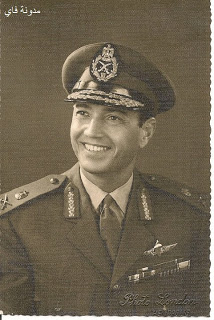Saad el-Shazly
| Saad El Shazly | |
|---|---|
 |
|
| Born |
1 April 1922 Basyoun, Gharbiya , Egypt |
| Died | 10 February 2011 (aged 88) Cairo, Egypt |
| Allegiance |
|
| Service/branch | Army |
| Years of service | 1942–1975 |
| Rank |
|
| Commands held | Commander of the first Paratroops Battalion in Egypt (1955–1959) Commander of the United Arab forces in UN mission to Congo (1960–1961) Military attaché in London (1961–1963) Commander of the 2nd Infantry Division (1965–1966) Commander of the Special forces Corps (Commandos & Paratroopers) (1967–1969) Commander in chief of the Third Field Army (1970–1971) Chief of staff of the Egyptian armed forces |
| Battles/wars |
World War II 1948 Arab–Israeli War Suez Crisis Six-Day War War of Attrition Yom Kippur War |
Saad Mohamed el-Husseiny el-Shazly (Arabic: سعد الدين محمد الحسينى الشاذلى, IPA: [sæʕd edˈdiːn elħoˈseːni eʃˈʃæzli]) (1 April 1922 – 10 February 2011) was an Egyptian military commander. He was Egypt's chief of staff during the October War. Following his public criticism of the Camp David Accords, he was dismissed from his post as Ambassador to Britain and Portugal, then he went to Algeria as a political refugee.
He is credited with the equipping and preparation of the Egyptian Armed Forces in the years prior to the successful capture of the Israeli Bar-Lev line at the start of the 1973 war. He was dismissed from his post on Dec 13 1973.
During the six day war al-Shazly showed great merit and tactical awareness. He was positioned in the middle of Sinai with a mixed unit of one infantry battalion, two Sa'ka(Thunderbold) battalions, and one tank battalion. Following the initial air raid and subsequent superiority of the IAF, the Egyptian command had given a chaotic order for all of its troops to retreat westward which would cause most of them to be mopped by the IAF, especially after most communications were lost between the troops and the Egyptian command; al-Shazly, however, took the most unbelievable of chances and headed eastward through thin passages and into the territory of Israel at that time. He eventually positioned himself in the Negev desert, ironically behind most enemy lines.
He stayed there with his battalions under the cover of two mountains to avoid IAF bombing for two days, the 6th and 7 June. Finally, he succeeded in making contact with the Egyptian command which ordered him to immediately retreat west of the Suez canal. He responded with one of the most difficult maneuvers executed in the history of the Egyptian/Israeli conflict , a night march(with mechanized units and tanks accompanying) in the desert and through enemy lines. Without any air support or intelligence, he succeeded in reaching the Suez canal with almost no losses where the crossing made his forces an easier target for the IAF costing him 10-20% of his units. He was then the last military commander to pass from the east of the canal to the west.
...
Wikipedia
